Factor Ostro VAM gen 2 review: dazzling performance
The updated version of Factor's aero all-rounder is lighter, narrower and searingly fast
Earlier this month Stevie Williams climbed to a goosebump-inducing, teeth-chattering victory at Flèche Wallonne, surging dramatically in full black winter kit to the top of the Mur de Huy and leaving the remnants of the frozen peloton to eat his sleet.
Williams is from Wales, where bad weather and hills are the norm, so perhaps it was no surprise that he emerged as the hardiest. For the last couple of months I’ve been riding the exact same bike that Williams was using (except for the paint) and it’s possibly no surprise that I’ve found myself going uphill faster than usual too – and everywhere in between. The new Factor Ostro VAM is super light, actually weighing 6.8kg in this Dura-Ace/Black Inc build, and although I haven’t taken it to a wind tunnel myself, my own average speeds back up Factor’s aero claims.
If a Welshman winning an attritional Flèche Wallonne is a good story, so is Factor’s. An American carbon-fibre expert who owns a factory in Taiwan takes over the side project of a British F1 component manufacturer and supplies bikes to AG2R. That was 2017, meaning Factor is a young brand with an owner who has a vast amount of experience in the carbon bike industry. Having its own factory allows Factor to control the design and manufacturing process from start to finish, compared to most other brands whose bikes are made by third–party factories.
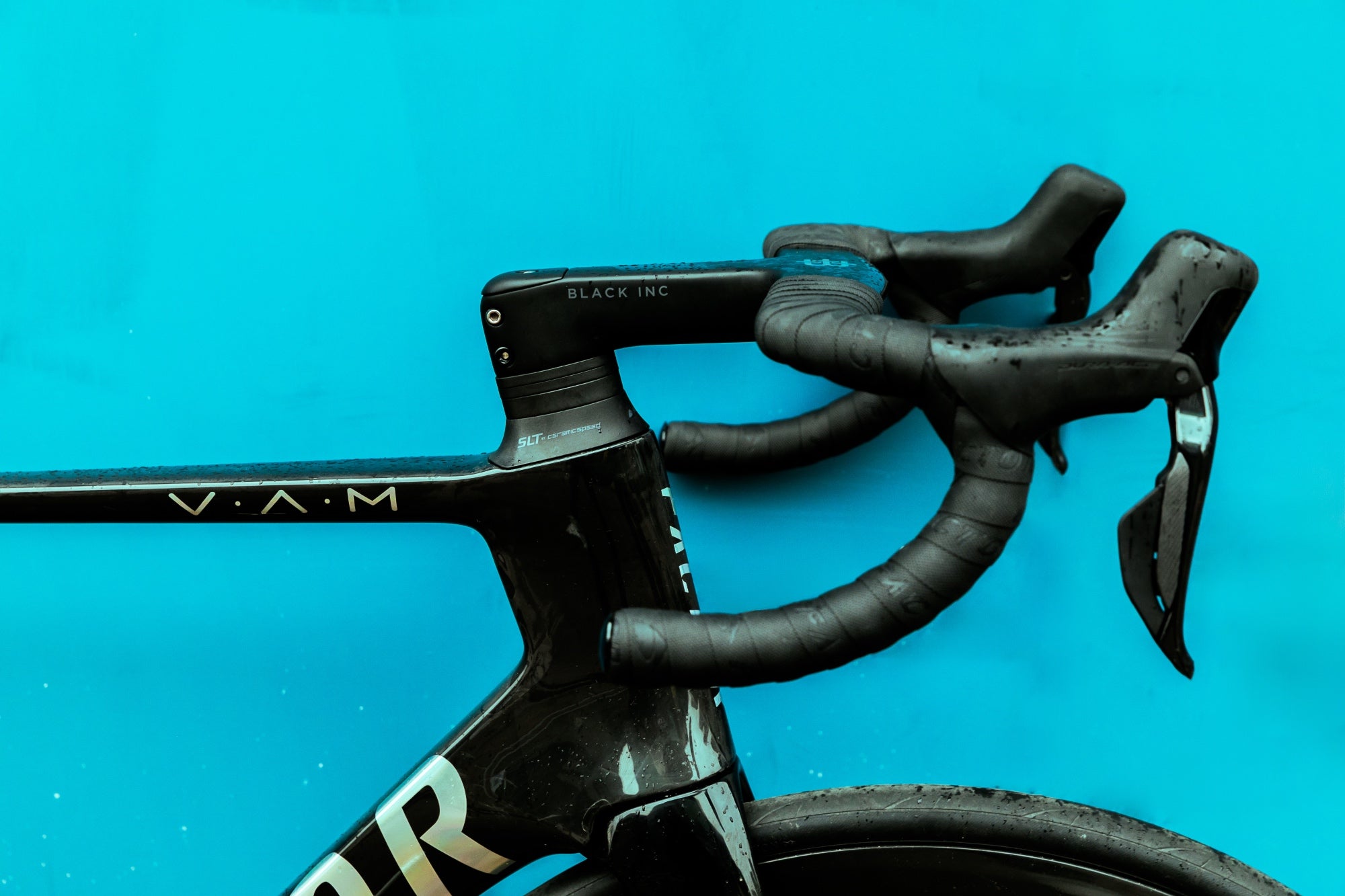
I wrote in some detail about the new Ostro VAM when it was launched to the public in February after the indefatigable Williams won the Tour Down Under on it at the start of what is becoming a breakthrough season for him. Factor’s aim was to make the bike more aerodynamic, mainly by exploiting the relaxation of the UCI’s rules limiting tubing and component dimensions. “The removal of the 3:1 rule for components about two years ago as well as the ability to reduce tube cross-sections below 25mm in the main tubes was something we were able to manipulate,” said the brand’s engineering director Graham Shrive. Factor said the resulting second-gen Factor Ostro VAM was 10% (seven watts) faster than the 2020 version and 10g lighter, mainly due to the narrower tubes. Now here are my own impressions.
Frame and fork
The narrow tubes are visibly extremely striking. I’ve had comments on how the seat tube in particular almost disappears when viewed from behind – and that’s because it is just under 2cm wide, with the seatpost even skinnier at 15mm. Needless to say, the Di2 battery is no longer in the seatpost – it has been relocated to a wider section of seat tube behind the bottom bracket, which is arguably also a better place for the bike’s centre of gravity anyway, and is accessed via a small trapdoor under the BB shell.
The bottom bracket itself is a T47 threaded design that runs on CeramicSpeed bearings with blue anodised cups – the only flash of colour in the monochrome scheme.
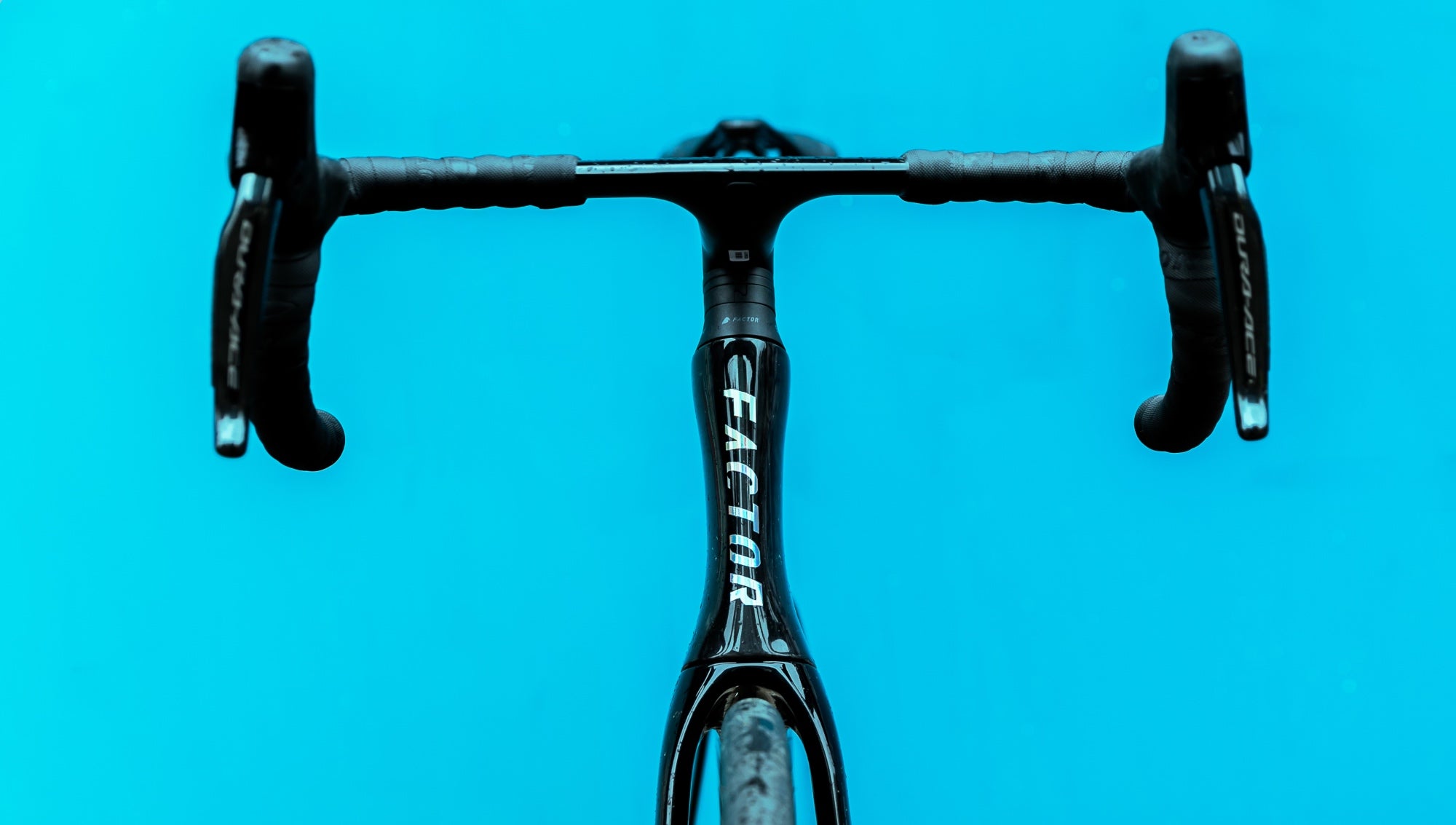
Factor says it’s at the front that the biggest changes have been made: the head tube now has a pronounced hourglass shape with a sharper leading edge, flaring to meet the fork crown as neatly as possible, which blends in turn with the down tube. The bike comes with a new cockpit from Black Inc, Factor’s component brand. Factor claims this “significantly reduces the drag of the combined bike and rider” and, in line with current thinking, it has a flare of 30mm so that hands are closer together on the hoods than on the drops.
Geometry
The seatpost has been steepened by 0.5 degrees, giving the size 56 that I tested a seat tube angle of 73.5 degrees, the same as the head tube angle, to give a classic but reactive geometry. With many pros using non-standard inline seatposts to sit further forward this is not surprising, but the rider position on the Ostro VAM is not overly aggressive and is comparable to that of other WorldTour race bikes, with the stack/reach ratio of the 56 at 1.44, exactly the same as the Cervélo S5, while the S-Works Tarmac SL8 has a slightly longer reach and has a ratio of 1.43. The wheelbase at 987mm is more or less the same as competitor bikes too and the short 405mm chainstays are fairly universal.
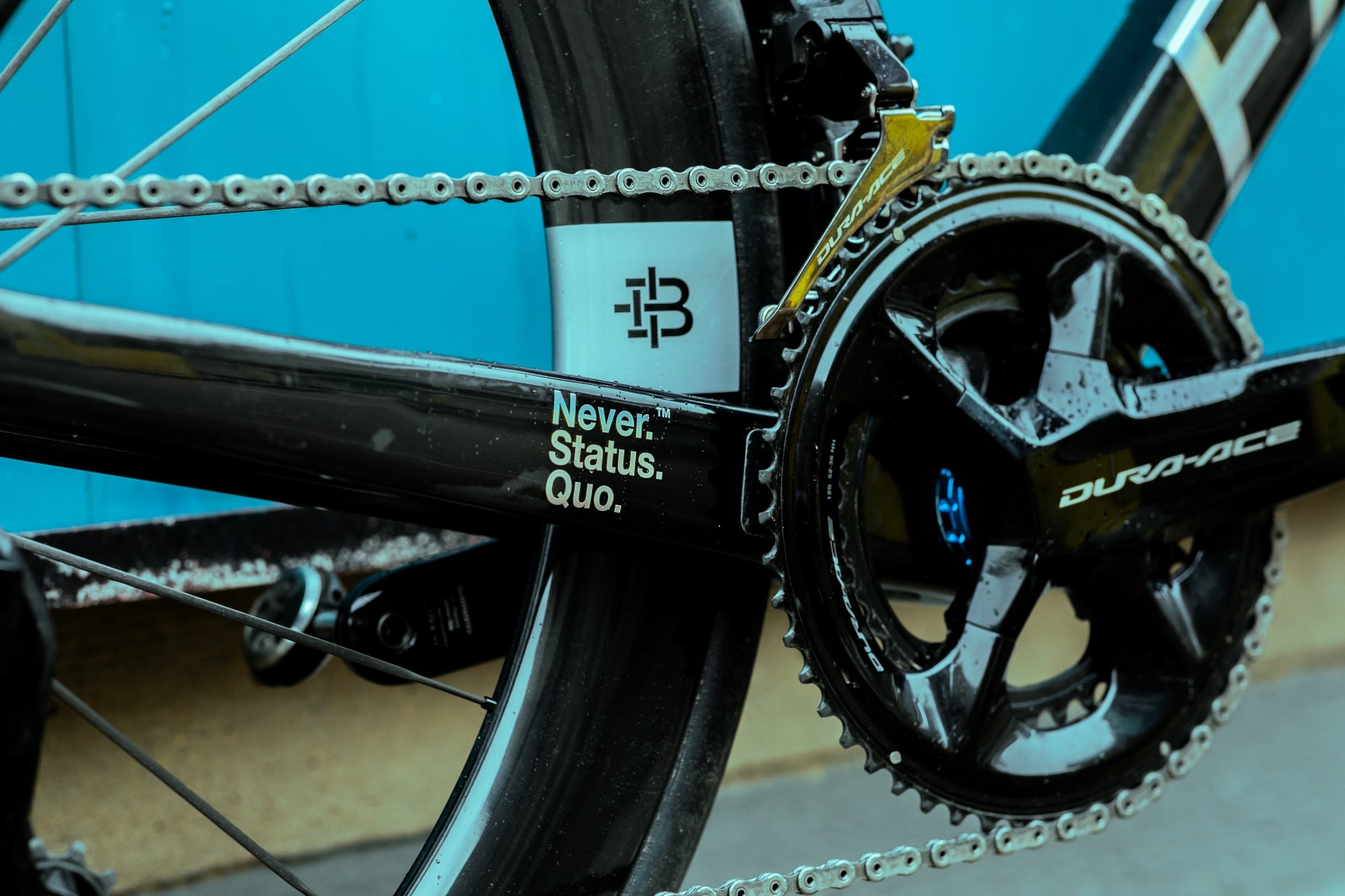
The other crucial measurement for road bikes in the 2020s is tyre clearance: the Ostro VAM has space for 32mm rubber – the same as the previous generation and the same as the Tarmac SL8. The Goodyear Eagle 700x28c tyres on the Black Inc 48|58 wheels measured an actual 30.5mm with a safe amount of daylight between the sidewalls in the insides of the chainstays. Factor has added a size 45 to a total of seven sizes, which go up to size 61 mostly in 2cm increments.
Wheels
Factor says it designed the Black Inc 48|58 wheels specifically to complement the Ostro VAM. They’re aero, lightweight, stiff, have a reasonably wide 23mm internal rim width and they’re very fast. They have bladed carbon straight-pull spokes, very pretty high-flange hubs with CeramicSpeed bearings and they weigh an impressive 1,270g.
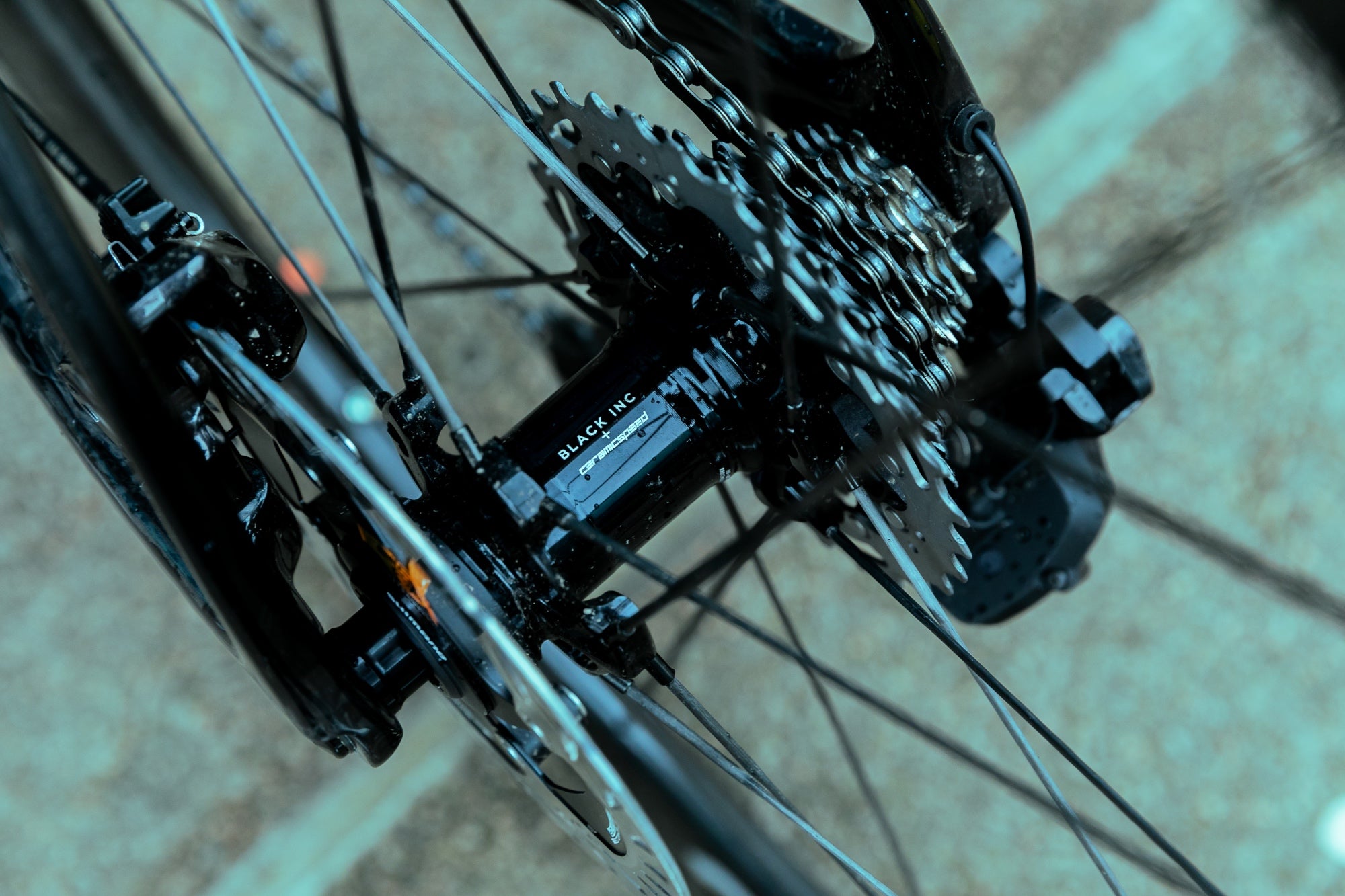
And, some people might be relieved to hear in light of the recent rim controversy, they’re not hookless. This means you can inflate tyres to beyond 72psi, should you wish to, and you can use standard clincher tyres and tubes. Our Ostro VAM came set up in the traditional way – clinchers and tubes – although the Black Inc rims are of course tubeless compatible. I asked Shrive why Factor wasn’t going down the hookless route with its new wheels. “We’re conventional road riders ourselves, I cannot get used to 72psi, and neither can our owner Rob [Gitelis]. Our ownership team informs a lot of our product development. We do have several hookless rims in our line and I encourage their use for gravel with a wider tyre, but overall we’re pretty happy with our width for the road and we’re not going with hookless. Yes, the blow-off pressure is probably about the same as hookless [as the manufacturers of hookless claim] but with the hook you have that little bit of extra safety.”
Another frequently quoted benefit of hookless is that straight walls are simpler and cheaper to manufacture. “That would be marginal to us,” says Shrive. “We don’t care how much the rim costs as long as it’s fit for purpose, whereas other more commodity-based companies with a higher volume will be very fussy about every extra dollar they spend on decals, finish etc. These new wheels are plus-$10 to get to the lower weight because we’re substituting in higher-end fibres.”

And aerodynamics? Hookless is said to reduce the lightbulb profile, allowing a smoother airflow from the tyre sidewall onto the rim. “With the 48|58, the inside to the inside surface is 24mm wide with a half millimetre hook either side,” Shrive points out. “ If you look at the way the tyre distorts, and we did quite a lot of work examining the profile of hookless vs hooked, there’s just not much of a difference with that half-millimetre hook. In the wind tunnel you’d have to do it 10 times to see if the weighting came down on either side. So the aero thing is a bit dubious and I'm not really sure why people are pushing it so hard for road use.”
The ride
As a bike built specifically for pro racing, the Ostro VAM is all about speed and high-end performance. But, as I discovered, that doesn’t preclude the enthusiast non-pro from getting a huge amount of pleasure from riding it. In the past I’ve found some pro bikes don’t come alive until they’re subjected to the sort of power only the pros can produce – their potential is not exactly wasted on amateur riders, but just most of the time it’s out of reach. This isn’t the case with the Factor. It has a nuanced, responsive feel from the off, though it's immediately evident that it has a huge amount of latent speed waiting to be unlocked. And this was the point: I was able to unlock it immediately. I’m not at my fittest in March and the unseasonably chilly weather we’ve had in the UK this spring has made the roads colder and slower, but I posted my second fastest ever time on a hilly circuit that includes the classic Surrey climbs of Leith Hill and Box Hill, taking a clutch of little Strava gold and silver medals.
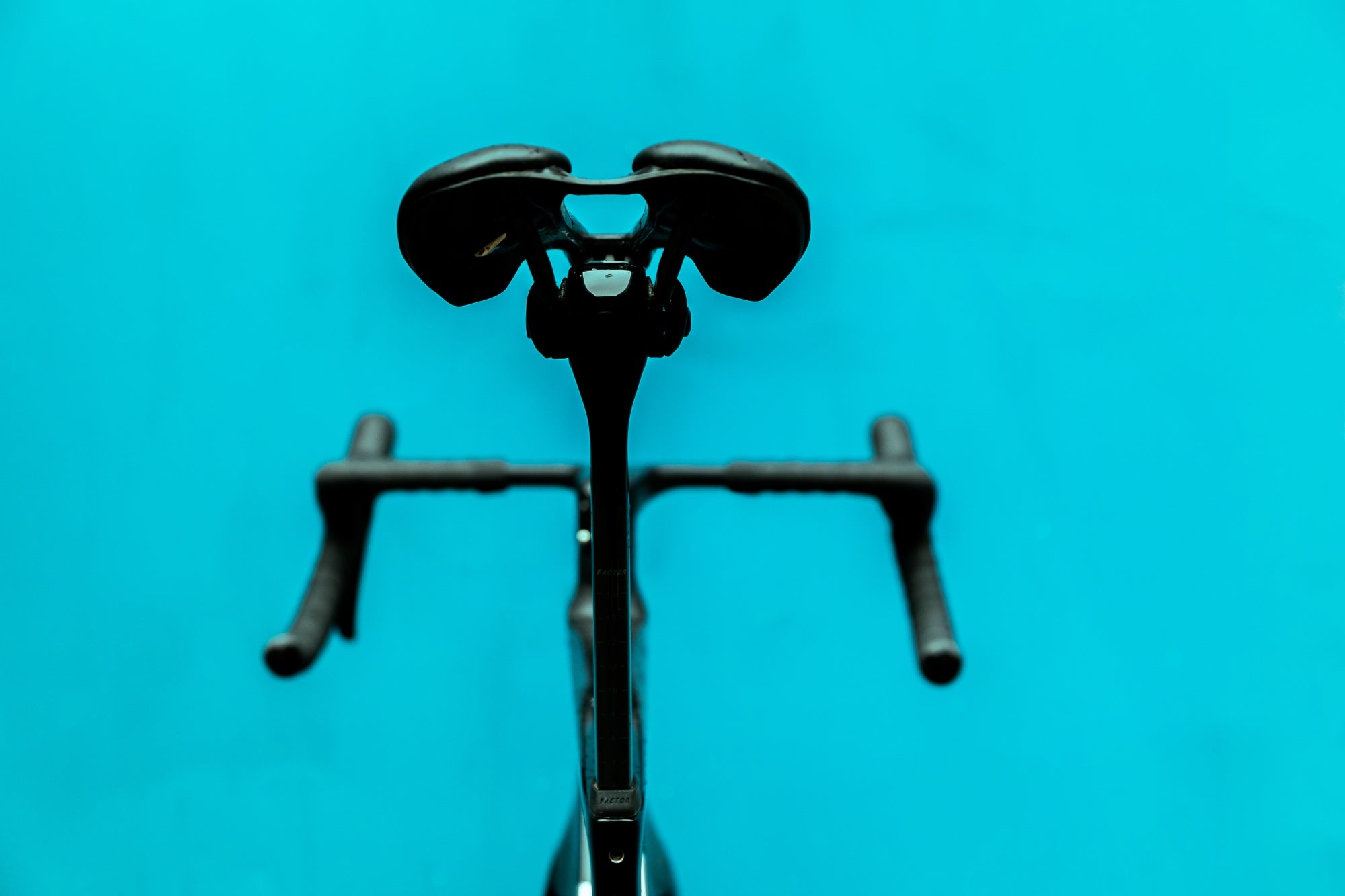
The Ostro VAM at 6.8kg will always be fast uphill and I was quite aware that I was the limiting factor here, but to equal my PR on a fast descent below Box Hill (out of 48 efforts going back to 2012) was quite significant. The bike descends like a rocket – or perhaps more like an arrow since it goes exactly where you point it – and going round this particular bend (Surrey cyclists will know which one) can feel a bit scary if you take it at over 40mph and keep your fingers off the brakes. But the Factor felt completely stable, 100% safe and even left me feeling that I’d been overly cautious. At speed the front end is super direct and the steering impeccable.
On flatter rides the superior aerodynamics are evident – it tears across the tarmac at high speed on the Black Inc wheels. I’m just disappointed that I’m sending it back before I’ve done an actual official road bike time trial on it because it would excel in those. I can’t think of a road bike I’d rather use for a fast, sporting circuit TT.
Verdict
The Factor Ostro VAM is for anyone who enjoys pushing their own performance on a road bike. At a measured 6.8kg it’s wonderfully light for an aero all-rounder so it goes up hills like Stevie Williams on the Mur de Huy. It’s also incredibly fast on the flat and super stable on high-speed descents. It excels at everything. Possibly if you prefer long, easy-paced coffee rides it isn’t the bike for you – though having said that, it will get plenty of admiring glances at the cafe. The narrow, bladed seatpost doesn’t supply much of the ‘vertical compliance’ that the endurance/all-road bikes are designed around. The Ostro VAM is a race bike, no mistake.
Factor kept the price of the new Ostro VAM the same as the old one, so although $11,199 or £10,799 for this Dura-Ace build, which is the same as the pro team spec, is premium, it actually undercuts many competitor WorldTour-level bikes – for me it’s a winner on every level.
For more information visit Factor's website.






























